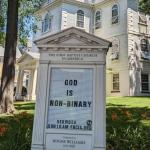Originally posted June 29, 2007.
Read this entire series, for free, via the convenient Left Behind Index. This post is also part of the ebook collection The Anti-Christ Handbook: Volume 1, available on Amazon for just $2.99. Volume 2 of The Anti-Christ Handbook, completing all the posts on the first Left Behind book, is also now available.
Left Behind, pp. 298-301
This section doesn’t quite work. If Tyndale Press had employed an editor for Left Behind (though, clearly, they did not), then that poor soul would have needed to convince Tim LaHaye and Jerry Jenkins to do a bit of rewriting here.
But as a reader I’m willing to cut them some slack for this passage for at least three reasons, which we’ll deal with in turn.
First, because this little interlude is somewhat nobly intentioned. It serves a kind of pastoral function for those readers who share the authors’ stern notion of the ultimate fate of those who have failed to pray the magic words.
Most of LB revels in the eternal suffering of the damned. The logical sequel to this series of books would be L&J’s Inferno — a journey through Hell in which the authors could savor the anguish and eternal torment of everyone who disagreed with them in this life: the scientists and seminarians; the humanists and humanitarians; the Catholics, Jews, Muslims, atheists, Episcopalians and mid-trib advocates; the thousands who die every day in poverty without ever having heard or accepted the innovations of Adventist eschatology that might have saved their immortal souls. All of these have committed the sin of blasphemy against the teachings of LaHaye, and so all receive their temporal comeuppance in Left Behind. The only thing that might bring the authors greater delight would be cataloging that comeuppance as they imagine it will occur throughout an eternity of deserved suffering.
But here, briefly, that triumphalism is put on hold as L&J consider the discomfort that this framework can cause to those readers who may have loved ones who have not yet spoken the magic words. Like Jesus said of the Pharisees, they have bound heavy burdens, grievous to be borne, and laid them on their followers’ shoulders. Unlike the Pharisees, though, L&J are at least willing, for a moment, to offer one finger to help carry the weight. This passage is that finger’s worth of help — their attempt to console readers with loved ones who reject premillennial dispensationalism and therefore, they believe, deserve Hell.
The stand-in for these lovers-of-the-damned is, of course, Rayford Steele, who we find racked with grief over the as-yet unresolved eternal peril facing his daughter Chloe. The interlude begins with the belated realization that this is not the only cause Rayford has for grief:
Rayford Steele could not sleep. For some reason he was overcome anew with grief and remorse over the loss of his wife and son. He slid out of bed and onto his knees, burying his face in the sheet on the side where his wife used to sleep. He had been so tired, so tense, so worried about Chloe that he had pushed from his heart and mind and soul his terrible loss. …
That “for some reason” is odd. It’s barely been a week since Rayford lost his wife and son (and his co-pilot, and surely a few other acquaintances, all at once, which has to account for something even with a friendless loner like Rayford). He’s barely had time to begin cycling through the Kubler-Ross stages of grief. There’s no wrong way to grieve, and it’s not at all strange that it takes a week for it to hit him like this. What is strange is that it doesn’t hit him like this again, repeatedly, in the weeks and months to come.
The one bit here that rings true is the recognition that his preoccupation with Chloe’s spiritual state has been a distraction from his grief. Late one night last month a friend of mine’s mother passed away. At 8 a.m. the next morning he was on the roof of his parents’ house, cleaning the gutters. He spent the next two days rebuilding their deck and redoing the landscaping in front of their house. This is something we humans do when confronted with death and grief. We clean. We throw ourselves into the welcome distraction of fixing those things that can be fixed because it helps to shield us from having to confront head-on that which cannot be fixed.
Rayford’s response to his loss, and his actions over the past week of the story, might have been richer — more human and more sympathetic — if we had been allowed to see him wrestling with his grief in this way. That would have entailed a level of complexity in which L&J don’t seem interested — or, worse, won’t allow. To what extent is Rayford’s newfound religious zeal a side-effect of the shock of loss? To what extent is his own conversion a form of bargaining (“God, if you’ll let me see Irene and Raymie again, I’ll …”)?
Those sorts of questions are off-limits in the world of LB, in which nearly always a good or evil deed is the result of a correspondingly good or evil motive. We’ve noted that Carpathia would have been a far more interesting character if his expressed idealism had been at all genuine, if the Antichrist had been portrayed as more of a tragic figure. But tragedy, and even the possibility of tragedy, is not part of L&J’s world. (Nor is comedy.) Fallen humanity, they seem to believe, is wicked, but not fallible — our only shortcoming is sin.
This denial of the tragic, ironically, leads to a hubristic view of human nature. It is also a failure to love. To deny the tragic is to suggest that God loves sinners less than Homer loved Achilles or Shakespeare loved Macbeth. Theology is always just as concerned with human nature as it is with the nature of God, and bad theology inevitably gets both wrong. This is bad theology.
The second reason I’m inclined to treat this section charitably is because, like an Olympic judge, I want to award points for degree of difficulty. Rayford is meant to be in anguish here, and anguish is not an easy thing to portray. Whether on the page or on the stage, the audience will always be able to tell if you’re faking it. Jenkins is faking it, which makes it seem like Rayford is too. We’re faced with the literary equivalent of overacting:
Rayford knew he had been forgiven for mocking his wife, for never really listening, for having ignored God for so many years. … But that didn’t stop the aching emptiness in his heart, the longing to hold his wife and son, to kiss them and tell them how much he loved them. He prayed for the grief to lessen, but part of him wanted it, needed it, to remain. …
As Rayford knelt praying and weeping, a new anguish flooded over him. He felt hopeless about Chloe. Everything he had tried had failed. …
Rayford had never felt more powerless and desperate. How he longed to have Irene and Raymie with him right then. And how he despaired over Chloe.
He had been praying silently, but the torment welled up within him, and despite himself he heard his own muffled cries, “Chloe! Oh, Chloe! Chloe!”
There’s more where that came from, enough of it to cause readers to suspect that Jenkins wrote this with an open thesaurus next to him, turned to the entry for “sorrow.” It’s not as howlingly bad as most of this book tends to be, but it does show again Jenkins’ trademark notion of ars poetica — for all the history of grief / the phrase “all the history of grief.” It’s not necessarily an inaccurate portrayal of the emotions we are told Rayford is feeling, but neither is it the sort of portrayal that would make any reader who actually has felt this think that Jenkins has felt the same thing. (I hope, for Jenkins’ sake, that the abstract quality of this scene arises from his never having experienced what Rayford is going through here. If that’s not the case, then he has my sympathy, but come on man, learn to use it.)
The final reason I don’t want to judge this scene as harshly as the text that surrounds it is because it deals, primarily, with character. This is, for L&J, rather uncharacteristic. Chloe’s eventual salvation is, like everything else in the book, mainly treated as a plot point — as an event that has to occur next, not because it flows out of the events that occurred before, but because the plot dictates that we must hurry along to the next dot on our Bible Prophecy Timeline. Reading LB is a bit like being on one of those rushed guided tours — No time for lingering in front of the Van Goghs, the agenda says we have to see all of the French Impressionists in the next 20 minutes. But here, for a moment, we’re allowed to linger:
“Are you all right, Dad?” she asked quietly.
“Yeah.”
“Nightmare?”
“No, I’m sorry to disturb you.”
“I miss them, too,” she said, her voice quavery. Rayford turned and sat with his back to the bed. He held his arms open to her. She came and sat next to him, letting him hold her.
“I believe I’ll see them again someday,” he said.
“I know you do,” she said, no disrespect in her voice.
Whatever its merits or demerits as a piece of writing, that scene, for once, treats the Steeles as human characters and not just pawns of plot and prophecy. Characters can’t be treated like that for very long before they begin to assert themselves, to begin making choices that the author may not have foreseen.
Such willfulness on the part of their pawns is something that L&J will not allow to go unchecked. They quickly reassert their control. As punishment for his brief flirtation with autonomy, Rayford is forced to take a passive role for the next 14 pages as flagrant exposition is dictated to him, first from CNN anchors who appear to have the authors’ outline of the book on their TelePrompTers, and then from Bruce Barnes, who delivers a sermon on “Hal Lindsey for Dummies.” Chastened by this beating, it will be a long time before Rayford again behaves as anything resembling a real human.
















